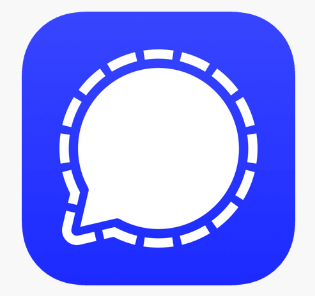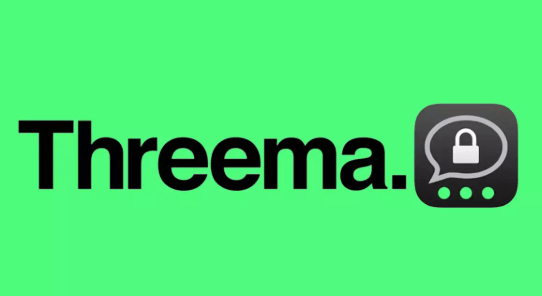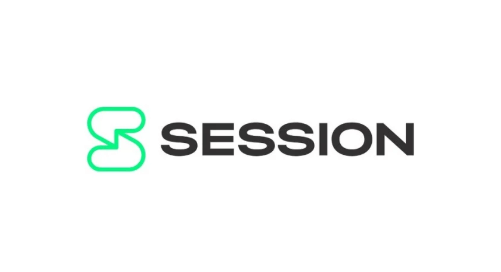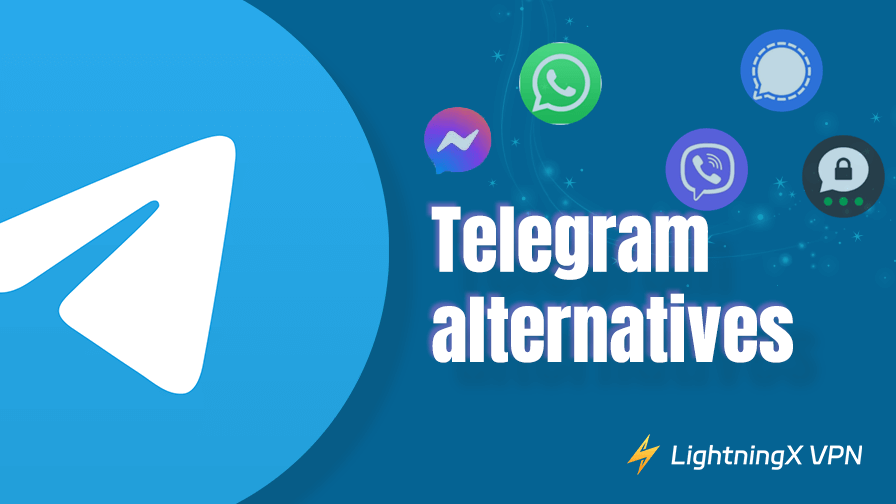Telegram is popular for its features, such as secure and fast messaging and groups, but it doesn’t satisfy everyone.
If you are concerned about Telegram’s privacy or need more features, this article will provide you with 15+ best Telegram alternatives, including secure messaging apps that protect user privacy and feature-rich chat apps with your friends.
Let’s take a deeper look at these apps similar to Telegram, enrich your chat methods, and improve work efficiency!
12 Best Telegram Alternatives
If you’re looking for an app like Telegram, here are the best Telegram alternatives in different categories.
Telegram Alternatives for Privacy-Focused Messaging
As Telegram has suffered a serious trust crisis, the phone numbers and user IDs of millions of users have been exposed. It is urgent to find a safer alternative to Telegram. Here are the apps that focus on privacy messaging.
1. Signal: A More Secure Messaging App Than Telegram

If Telegram doesn’t meet your security needs, Signal can be one of the best Telegram alternatives. As someone who has tested dozens of communication apps over the years, I can confidently say that Signal is one of the few apps that is truly secure.
Signal is free, open source, and backed by a nonprofit, which means it won’t sell your data or push ads to you. It uses end-to-end encryption to keep your messages, calls, and media private.
Currently, Signal has become the first choice for journalists, activists, and cybersecurity experts. It is not just for professionals, but for everyone who wants to protect their personal privacy. If you are planning to switch to a secure chat app, Signal is the best choice. Because of this, it has a permanent place on my phone.
Signal features
- Private messaging: Send texts, pictures, voice messages, videos, GIFs, and documents, all encrypted.
- Voice and video calls: Make one-on-one or group calls (up to 50 people).
- Group chats: Supports groups of up to 1,000 people, with admin controls and privacy options.
- Stories: Post ephemeral stories and have full control over who sees them.
- No ads, no tracking: Signal collects virtually no user data and doesn’t sell anything to advertisers.
- Cross-platform: Available for Android, iOS, Windows, Mac, and Linux.
Cons: Requires a phone number to register
Using Signal is as easy as using iMessage or WhatsApp, but with more peace of mind. I use it to stay connected with friends and colleagues, and never have to worry about who’s spying on me or where my data is going.
2. Threema: Niche Private Messaging App

Speaking of secure communication, while Threema isn’t as well-known as Telegram, it uses end-to-end encryption and doesn’t require a phone number or email address to sign up. Once you sign up, you’ll get a randomly generated Threema ID that’s completely anonymous.
One of the highlights of Threema is Threema Safe. It allows you to securely back up your Threema ID, groups, and contacts to Threema’s servers or your own.
However, in the few months I’ve used it, some users and I have encountered bugs in video calls, such as hearing an echo or the audio cutting out completely until the app is restarted.
Threema Features
- End-to-end encryption using open-source NaCl encryption technology.
- Complete anonymity without a phone number or email address.
- Voice and video calls, including group calls.
- File sharing (pictures, documents, videos, ZIP files).
- Two-way message editing and deletion.
- Servers are located in Switzerland, which has strong data protection laws.
- Open source and GDPR compliant.
Cons
- No free version or free trial.
- No 2FA (two-factor authentication).
Threema is not for everyone, especially when your friends and family use WhatsApp or Telegram. But if you have the need to protect privacy and security, and are willing to accept a new app, then Threema is definitely one of the most worthwhile apps to try.
3. Session: Private Group Chats Without Phone Numbers

If you need an app that offers group functionality, like Telegram groups, with a focus on privacy and anonymity, Session is the ideal choice. Session is a free, open-source, end-to-end encrypted instant messaging app that runs on a decentralized web.
The app supports Android, iOS, Windows, macOS, and Linux systems, and supports text chat, media sharing, audio clips, and secure group conversations. Adding contacts requires scanning a QR code or pasting their Session ID. In one-on-one chats, text and pictures display normally, but messages are occasionally delayed. Session’s groups are great for small communities, and while it doesn’t support large public channels like Telegram, it is more secure and private.
Session Features
- No phone number, email, or name required to sign up.
- All messages, calls, and media are end-to-end encrypted.
- No central database needed to be hacked or leaked.
- Your IP address and usage patterns are hidden.
- Supports group chats (up to 100 people) with end-to-end encryption.
- Free to use, no ads, no trackers.
- Open source app with code viewable by anyone.
Cons
- Messages sometimes take minutes to process.
- You can’t easily find someone unless you know their session ID or QR code.
If your top priorities are privacy and anonymity, Session is one of the best Telegram alternatives. It has lossless encryption and decentralization that privacy enthusiasts dream of.
When exploring Telegram alternatives, it’s important to protect your privacy and stay secure. LightningX VPN is the perfect solution.
With 2000+ servers and advanced encryption, it keeps your connection safe and helps you unlock region-restricted platforms. Plus, you can enjoy a free trial and 30-day money-back guarantee.
Telegram Alternatives for Channels, Communities, and Groups
If you’re looking for an app that’s packed with features and better suited for entertainment and social interaction, the options below might be a better fit for you.
1. Discord: A Feature-Packed App for Community

Originally built for gamers, Discord has become the go-to platform for almost any type of group chat: games, study groups, fan communities, and even friends gatherings.
Discord offers a wealth of group features, including text messaging, voice chat, and game live streaming, allowing you to stay connected and entertained with friends and colleagues at any time. Discord voice chat is simple and easy to use, without having to make a phone call or wait for the other party to agree. Game live streaming or screen sharing is smooth, and you can also browse emojis while chatting with friends.
Compared to the single function of telegram groups, Discord focuses on flexibility and fun. You can create custom servers and then organize them into channels with different themes, such as games, journeys, etc.
That being said, there are some frustrations. Some users have reported audio glitches or occasional stuttering during voice chats.
Read more: How to Get Unblocked Discord at School/Work/College?
Discord features
- Provide rich features such as chat, calls, video, and live streaming.
- Customize everything, including emojis, permissions, status, and sound effects.
- Seamlessly switch between platforms such as mobile, PC, and web.
Cons: Unlike security-focused Telegram alternatives, Discord does not offer full end-to-end encryption (E2EE).
2. Mighty Networks: Build Courses, Events, and More in One Place
Mighty is based on the concept of “People Magic”, using advanced technology and artificial intelligence to connect the right people in your community. It is smarter, more structured, and easier to grow than Telegram.
Mighty is not just a chat platform, but a full-stack platform that allows you to build, monetize, and expand your own brand community, whether you are a creator, coach, educator, or brand. It integrates the tools you usually need on 4-5 different platforms: chat, events, live broadcasts, online courses, and even branded mobile apps. No more need to spread your fans across Instagram, Zoom, email lists, and other areas.
Mighty Features
- One place to manage all your communities.
- Smart member matching through AI to spark relevant conversations.
- Instant starter tools to help you launch your group in an organized way.
- Unlimited members, spaces, and admins are included on all plans.
- Live streaming, event hosting, and course creation.
- White label option, including a fully branded app with your name.
- Reliable security (SOC2 compliant) and proven performance.
Cons:
- Branding costs more, and full white label functionality requires upgrading to Mighty Pro.
- Not as focused on anonymity
If you’re looking for an app that does more than just send messages, Mighty is one of the smartest, most comprehensive platforms out there. Perfect for creators, brands, and educators who want a space to build, teach, monetize, and grow communities.
3. Rakuten Viber Messenger: End-to-End Encryption Meets Playful Messaging
Viber is a free instant messaging and calling app developed by Rakuten. With over 1 billion users worldwide, Viber offers fast, secure messaging, high-quality voice and video calls, and some lightweight community features, making it a strong alternative to Telegram.
You can use Viber to send text, photo, video, and voice messages, or make crystal clear voice or video calls.
One of Viber’s biggest strengths is privacy. All one-on-one and group conversations are end-to-end encrypted by default, with no settings to toggle or complicated navigation menus.
On top of that, it has a rich collection of stickers, GIFs, polls, emojis, and even AR face filters to make everyday chats more fun. It definitely feels more lively and personal than more basic apps.
Viber Features
- Free messaging and group chats (up to 250 participants)
- High-quality voice and video calls, including group chats for up to 60 people
- Viber Out lets you make low-cost international calls to mobiles and landlines
- Disappearing messages with adjustable timers for enhanced privacy
- Massive library of stickers and GIFs, plus fun AR effects
- Cross-platform support for Android, iOS, Windows, and macOS
- AI bots to help you shop, travel, and even create art
Cons:
- In-app ads may disrupt the experience
- Limited community tools, no support for events, paid content, or structured interactions.
If you’re looking for an app that supports group functionality like Telegram, Viber is a great choice. It’s easy to use, has great performance, and can add fun and creativity to everyday chats.
Business & Team Collaboration Apps Like Telegram
1. Slack: Structured Messaging for Productive Teams
Slack is an instant messaging tool built for team collaboration and organizational development. It has a longer history than Microsoft Teams and is widely used by startups, remote teams, and large enterprises.
I have used Slack in various roles, and one of its great things is that it is easy to set up and scale. I have used it in teams of 5 and organizations of 500, and it is very adaptable. You can create private groups, limit who can post in announcement channels, and even build a searchable knowledge base over time through conversations.
Although Slack was not designed to be a casual social group like Telegram, it does a great job of organizing conversations, managing projects, and keeping teams focused.
Slack Features:
- Channels: Organize discussions by team, topic, or project to make it easier to post and find information.
- Group Discussions: Instantly start an audio chat with your team members for quick discussions.
- App Integrations: Connect to Google Drive, Dropbox, Asana, Zoom, and hundreds more.
- Cross-Platform Access: Use Slack on your computer, phone, or tablet.
Cons:
- Not suitable for relaxed one-on-one chats.
- Slack relies on integration tools like Zoom for full conferencing capabilities.
2. Google Chat: Best for Teams in the Google Ecosystem
Google Chat isn’t the flashiest messaging app on the market, but it’s probably the most convenient. While it doesn’t have the social aspects of Telegram, Google Chat is great for business communications, small groups, and close-knit teams.
If your primary goal is team collaboration rather than public groups or community building, Google Chat is a solid alternative to Telegram. Especially if you already use Gmail and Google Drive, adding Google Chat to your daily workflow is a no-brainer.
Google Chat features:
- Deep integration with Google Workspace to share documents, sheets, and slides directly in chat
- Create dedicated chat rooms for different teams or projects
- Built-in meetings and calendars to schedule or join Google Meet meetings directly from chat
- Supports enterprise-grade data breach prevention and management controls
Cons:
- No public channels or discoverability like Telegram
- Lacks end-to-end encryption
- No stickers, limited theme options, and limited customization
3. Chanty: A Lightweight Telegram Alternative for Teams
Chanty is like a lightweight Slack, designed for teams and workplaces, but very simple to use. It supports one-on-one chats, to-do lists, and quick, frequent calls. Teams that have used Chanty rave about its simplicity and reliability.
Chanty focuses on team communication and collaboration. Its goal is to allow you to get work done without switching between a dozen apps. If you are looking for a work alternative to Telegram, Chanty is a good choice.
Chanty features:
- Public and private chats with unlimited messages.
- Voice and video calls.
- Built-in task management with boards, deadlines, and priorities.
- Teambook Hub brings all your conversations, tasks, files, and links together
- Voice messaging and file sharing
- Integrates with your favorite tools
Cons:
- No Telegram-style public channels or broadcasting features
- Limited customization
Social & Entertainment Apps Like Telegram
1. LINE: Asia’s Favorite Chat App with Stickers and Security
LINE is often overlooked in the US when it comes to Telegram competitors, but it definitely deserves a mention. Originally developed by Naver in South Korea and now widely used in Japan, Taiwan, and Thailand, LINE offers a fun way to communicate that goes far beyond simple messaging.
LINE shines with its massive sticker collection, and you can use it for text, voice, and video calls. LINE is available on iPhone, Android, desktop, and even Apple Watch.
LINE offers end-to-end encryption (letter seals) for both messaging and call data, which is essential for privacy-conscious users who want to migrate from Telegram to LINE.
Read more: LINE Sign Up & Download: Quick Start Guides
LINE Features
- Messages, voice, and video calls
- Supports themes to customize the look of the app and a rich collection of stickers.
- Memos help save quick notes, photos, or links.
- Offers end-to-end encryption
- Includes a built-in wallet feature (currently works best in Asia)
Cons:
- Not fully optimized for the US market (like LINE Pay or VOOM)
- Third-party apps (like LINE Go) are difficult to find and set up
2. Snapchat: Not Usual Telegram Alternative, But Worth the Snap
As one of Telegram’s competitors, Snapchat will bring you a new communication experience, especially for those who like to share their lives through photos and videos instead of text chats.
Snapchat’s core is simple: take a photo or video, send it, and the message disappears after the user views it. You can also have one-on-one or group chats, which are perfect for casual conversations.
Snapchat offers filters, AR lenses, text, emojis, and doodles. These tools allow you to personalize your content before sending it. You can also post a story, which will remain for 24 hours, to let your friends know what you are doing.
As someone who has tested Snapchat in depth, I want to tell you that Snapchat is not a typical Telegram replacement. But Snapchat is stable, complete, and frequently updated. Once you get started, you will feel the fun of it.
Read more: Snapchat Web: How to Use Snapchat on PC?
Snapchat features
- Instantly share videos and pictures.
- Snap Maps allows you to see the location of your friends in real time.
- Messages that disappear after reading make content easier, more convenient, and neater.
- One-on-one and group chats
- You can create cartoon-style avatars with Bitmoji and use them throughout the app.
Cons:
- Since messages disappear after reading, it is not suitable for serious occasions such as work.
- All filters and videos will seriously consume the battery of the phone
3. WhatsApp: Secure Messaging for 2 Billion Users
WhatsApp is one of the most popular messaging apps, with more than 2 billion users worldwide. It allows you to text friends, call your family far away, or share photos and videos. One of the most powerful features of WhatsApp is the built-in encryption. All text messages, calls, and shared files are end-to-end encrypted by default, which means that only you and the people you are communicating with can read or listen to the shared content.
Many users like WhatsApp for its stability and ease of use. It is very convenient to make calls, post updates, or create group chats. Despite this, there are occasional complaints, such as the lack of customization options. But this does not affect its emergence as the best telegram alternative.
Overall, however, WhatsApp meets the needs of most people: secure and reliable daily communication.
Read more: Is WhatsApp Safe? WhatsApp Review
WhatsApp Features
- Free voice and video calls (including international calls)
- WhatsApp supports Android, iOS, and desktop devices.
- Default end-to-end encryption
- Simple and intuitive interface.
- Includes social features to share short updates.
Cons:
- Compared to Telegram, WhatsApp limits file sharing to a maximum of 2 GB.
- WhatsApp is only suitable for private or small group chats.
- WhatsApp only stores your chat history locally.
- You cannot use WhatsApp anonymously or with a username.
Best Telegram Alternatives Comparison Table
We have introduced you to the above 12 Telegram alternatives. If you are short on time, you can read the quick table below to find the app that best suits your needs.
| App | Key Features | Drawbacks |
|---|---|---|
| Signal | End-to-end encryption, no ads, open-source, trusted by experts | Requires phone number |
| Threema | Anonymous signup (no phone/email), Swiss servers, encrypted backup | Paid app, no 2FA |
| Session | Decentralized, no phone/email needed, anonymous, open-source | Slower message delivery, hard to find users |
| Discord | Voice/text/video chat, live streaming, customizable channels | No full E2EE, occasional voice glitches |
| Mighty Networks | All-in-one platform (courses, events, community), AI member matching | Costs more for branding, not anonymous |
| Viber | E2EE, group chats, international calls, stickers, AR filters | In-app ads, limited advanced community tools |
| Slack | Channels, integrations (e.g., Google Drive), cross-platform, good for large teams | Not social, no built-in video conferencing |
| Google Chat | Google Workspace integration, secure, supports Meet & Docs | No E2EE, lacks themes/customization |
| Chanty | Team chat, task management, unlimited messages | No public channels, very basic customization |
| LINE | Stickers, themes, E2EE, built-in wallet, popular in Asia | Not optimized for US users, third-party tools limited |
| Snapchat | Disappearing messages, filters, stories, Bitmoji | Not work-friendly, high battery usage |
| E2EE by default, large global user base, stable | No anonymous use, limited file sharing & features |
Other Apps Similar to Telegram
If the apps mentioned above don’t fully meet your needs, there are more options to explore. While these alternatives may not be as feature-rich as the others, each one offers unique advantages that might be just what you’re looking for.
1. Element (formerly Riot)
An open-source instant messaging app built on the Matrix protocol, perfect for users or teams who want to control their own data and infrastructure.
Features: Self-hosted, cross-platform bridges (e.g., connects to Slack/Telegram), end-to-end encryption.
2. Wire
A secure collaboration tool developed in Europe with a strong focus on privacy, compliance, and team productivity.
Features: Encrypted messaging, file collaboration, and business-friendly video conferencing.
3. Tox
A truly decentralized P2P instant messaging app with no central server, perfect for privacy advocates who want to avoid being monitored or blocked.
Features: No accounts, no servers, unblockable communication through peer-to-peer architecture.
4. Geneva
A warm, community-centric messaging app that combines casual chat with events and online meetup tools.
Features: Live streaming, group chat, event calendar, and voice/video capabilities.
5. Zulip
A popular app in the developer community, Zulip organizes conversations into threaded streams to keep the train of thought clear.
Features: Stream-based messaging, open source, supports Markdown for technical discussions.
6. Kik
An anonymous messaging app popular among young people, with public chat rooms and chatbots.
Features: No phone number required, open chat community, and content discovery.
7. WeChat
A widely used chat app in China, integrating messaging, payment, and life services.
Features: Text and voice chat, social dynamics (friend circle), mini-programs, and WeChat payment integration.
8. QQ
A long-standing Chinese communication app that combines messaging with music, avatars, and entertainment features.
Features: Group chat, media sharing, customizable profiles, and rich social features (such as QQ space).
Why You Should Choose These Apps Like Telegram?
Whether you’re looking for greater privacy, more powerful community tools, or more features, you can find a Telegram alternative that’s right for you.
1. Stronger privacy and security
Telegram has been criticized for encryption and user data, and a recent serious data breach has raised concerns.
A 900MB database containing the personal information of millions of users was exposed on the dark web. About 70% of the affected accounts were from Iran, and 30% were from Russia. Even if you’re not in those regions, your data is not as safe as you think.
2. More community features
Telegram is great for broadcasting, but not so good for building real community interactions. Apps like Discord and Mighty Networks excel in this regard.
3. More customization and monetization features
Want to brand your group and even earn some income? Telegram doesn’t offer many tools in this regard. Some apps allow you to set custom features, offer tiered memberships, and create groups that better suit your personal space style.
4. Additional communication tools
If you need more than just messaging, Telegram does not support richer features. Apps like Skype and WeChat offer video calls, screen sharing, and deep social media integration.
FAQ: Telegram Alternatives
1. Is Telegram no longer safe?
Telegram is still very secure. It offers features like two-factor authentication and customizable privacy settings, but regular chats are not end-to-end encrypted by default, which means your standard messages are stored on Telegram’s servers and could be accessed.
If you use it for sensitive conversations or are very concerned about privacy, you’ll want to specifically enable secret chats and two-factor authentication (2FA).
2. What is the most secure messaging app?
Signal is widely considered the most secure messaging app. It uses end-to-end encryption by default for all messages and calls, and doesn’t collect your data. It’s open source, ad-free, and run by a nonprofit.
3. Which app is most like Telegram?
If you’re looking for an app that’s closest to Telegram in terms of its experience, both Signal and Discord are great options.
Signal is closest to Telegram in terms of its focus on privacy and group messaging, with end-to-end encryption and a simple interface. Discord is more like Telegram in terms of community features, group chats, and channels. It’s great for large groups, content sharing, and voice/text channels.















